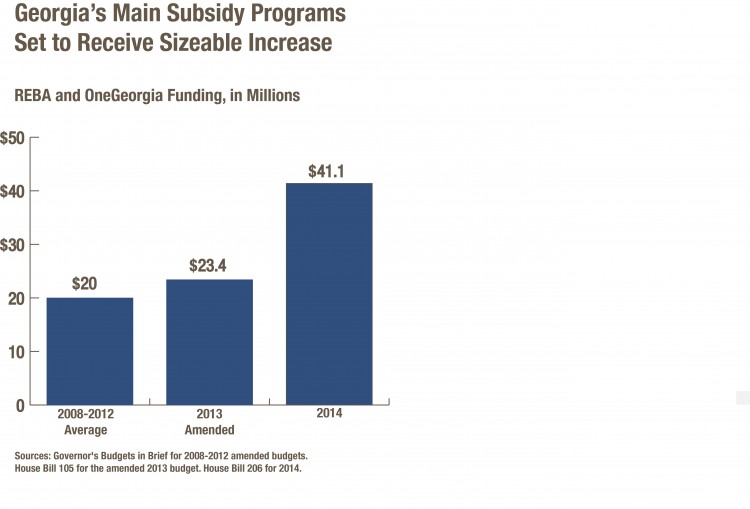 The 2014 budget passed by the General Assembly keeps most of Georgia’s economic development spending unchanged from Gov. Nathan Deal’s recommendation, except for an extra $5 million for business subsidies in rural parts of the state. Georgia is set to spend nearly $104 million in the upcoming budget year on development-oriented programs through the Departments of Economic Development and Community Affairs, a slight increase from the governor’s original proposal.
The 2014 budget passed by the General Assembly keeps most of Georgia’s economic development spending unchanged from Gov. Nathan Deal’s recommendation, except for an extra $5 million for business subsidies in rural parts of the state. Georgia is set to spend nearly $104 million in the upcoming budget year on development-oriented programs through the Departments of Economic Development and Community Affairs, a slight increase from the governor’s original proposal.
The OneGeorgia Authority will receive $20 million in the 2014 fiscal year, an increase from $15 million originally proposed by the governor. Created in 2000, OneGeorgia provides various grants and loans to local communities, including so-called “deal-closing funds” meant to attract new companies and retain existing ones in rural areas. OneGeorgia received nearly a half-billion dollars in taxpayer money from the 2001 to 2012 fiscal years, nearly $200 million of it used to help close deals.
The budget the Legislature sent to the governor confirms that Georgia’s leaders believe deal-closing subsidies should be an important strategy to improve Georgia’s economy. The state’s two main deal-closing programs, OneGeorgia and Regional Economic Business Assistance Grants, (REBA), will receive about $41 million in 2014, a sizable increase from current and historical funding levels. Combined funding for REBA and OneGeorgia will comprise 40 percent of the budgets for the Economic Development and Community Affairs departments in 2014. But because these programs are not required to regularly report on their performance, it is impossible to know what taxpayers are getting in return.
Funding for other economic programs, such as recruiting businesses and attracting tourists, remains mostly unchanged from the governor’s original proposal. With funding levels static, support for many of these programs remains far below pre-recession levels. For example, since the last budget before the recession, funding is down 26 percent for business recruitment, 45 percent for tourism projects and 87 percent for support to the arts. Without new revenues, these and other important state investments are likely to remain stagnant.









